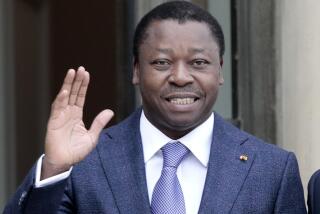Cambodians Approve New Constitution : Asia: Assembly hands nation’s future to a monarchy and coalition rule. Sihanouk will return as king.
- Share via
SINGAPORE — Cambodia’s Constituent Assembly overwhelmingly adopted a new constitution on Tuesday, placing the country’s future in the hands of a constitutional monarchy and a delicately balanced coalition government.
Under the new charter, Prince Norodom Sihanouk--the dominant figure in Cambodia’s modern history who abdicated the throne in 1955 to become a political leader--will return as king.
Sihanouk, 70, is undergoing medical treatment in Beijing for what he has described as prostate cancer. He is scheduled to return to Phnom Penh on Thursday to sign the constitution, be named king and appoint the government.
In a message from Beijing, Sihanouk declared: “I heartily congratulate the assembly on their historic success, in their noble work in providing the nation with an extremely liberal and democratic constitution.”
The adoption of the constitution and appointment of the new government is the final act of a two-year U.N. peace effort designed to end the country’s civil war. At the height of its involvement, the United Nations deployed 22,000 soldiers and civilian officials to organize free elections; the effort cost an estimated $2.6 billion.
As soon as the new government is installed, Yasushi Akashi, the head of the U.N. Transitional Authority in Cambodia, is expected to leave the country. About 12,000 peacekeeping troops remain and are being withdrawn over the next three months.
The new constitution--adopted by the Constituent Assembly by a vote of 113 in favor, five opposed and two abstentions--creates a form of government unique to Cambodia. It will have two prime ministers, known as first prime minister and second prime minister, symbolic of the coalition government between the winners and losers in the May elections.
The first prime minister will be Prince Norodom Ranariddh, Sihanouk’s son and political heir, who lead the royalist FUNCINPEC party in the election. The party received a plurality of 58 seats, but not enough to govern on its own. “I am very happy,” Ranariddh said after Tuesday’s vote. “It’s a great success for the Cambodian people.”
The second prime minister will be Hun Sen, the former Communist who ruled Cambodia for much of the 1980s. Hun Sen’s party finished with 52 seats in the election but threatened to ignore the ballot results unless it was an equal partner in a coalition government.
The two prime ministers’ duties were not spelled out in the constitution, leaving open the possibility of great confusion when difficult decisions must be made. Sihanouk is also known for playing politicians off against one another, creating even more possibilities for instability.
Most senior government jobs are expected to remain in the hands of the current occupants, who took office in a coalition soon after the election results became known. Officials have said that about half of the provincial governorships--now entirely held by members of Hun Sen’s party--will be given to FUNCINPEC supporters.
The military and police remain largely as they were in the past, with followers of Hun Sen in most senior jobs. But a number of senior military officials have pledged to be politically neutral in carrying out the task of forming a united army after decades of civil war.
Sihanouk has said he no longer wants a formal coronation so as to save the country money. The traditional crown and sword of Cambodia’s king was lost in the turbulent 1970s under the rule of the dreaded Khmer Rouge guerrillas.
More to Read
Sign up for Essential California
The most important California stories and recommendations in your inbox every morning.
You may occasionally receive promotional content from the Los Angeles Times.













